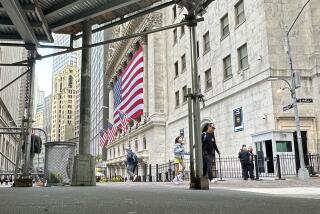Interest Rate Hopes Trigger Rally in Bonds
The Treasury long bond’s price rose as its yield slipped to another four-year low Monday in anticipation of a Federal Reserve move to ease interest rates, while stock prices ended the final day of the third quarter on a firm note.
In the commodities markets, gold prices jumped nearly $5 an ounce in response to news reports that the Soviet Union’s hoard of gold is far smaller than U.S. government officials and many financial market observers had thought.
Credit
The price of the Treasury’s bellwether 30-year bond gained 5/32 point, or $1.56 per $1,000 in face amount. Its yield slipped to 7.80% from Friday’s 7.82%. It was the bond’s lowest yield since it hit 7.64% on March 27, 1987.
Bond yields fall on a signs that interest rates in general are heading down. Traders are growing more convinced that the Federal Reserve will ease credit again soon to keep the recovery on track.
The Fed’s policy making Federal Open Market Committee is meeting in Washington today to discuss monetary policy. Economists believe that the Fed might cut interest rates as soon as Friday, after the influential unemployment report for September is released.
Many traders believed that if the numbers are weak enough, the Federal Reserve will lower the federal funds rate, the interest banks charge each other for overnight loans, by a quarter percentage point from its current target, which is believed to be 5.35%.
The fed funds rate was quoted at 5.50%, up from 5% late Friday.
Stocks
The Dow Jones average of 30 industrials rose 10.73 points to 3,016.77, while advancing issues outnumbered declines by more than 2 to 1 on the New York Stock Exchange.
Big Board volume came to an estimated 149.83 million shares, down from 160.66 million Friday.
Trading was choppy amid intermittent waves of computerized buy and sell programs. But buyers came in after the Dow recouped from the day’s low of 2,990.
“It refused to stay down there,” said Jack Solomon, a Bear, Stearns & Co. technical analyst.
Still, many investors were hesitant to make major moves in advance of third-quarter earnings reports, and in advance of Friday’s September employment report.
“We’re not going to go anywhere ahead of Friday’s employment data,” said Robert Walberg, an MMS International analyst. “The (stock) market’s just going to go sideways until we get a clearer picture on the economy and earnings.”
Among the market highlights:
* Some defense stocks extended their declines after President Bush’s proposal Friday to cut the U.S. nuclear arsenal. Northrop lost 1/4 to 23 1/4, Raytheon fell 1 to 77 5/8, Martin Marietta eased 1 3/8 to 50 7/8, Lockheed fell 1 1/8 to 39 7/8, and Loral eased 1 to 37 5/8. (Story, D1.)
* In the latest health-care casualty, Zenith Labs dropped 7 1/2 to 12 1/4 after a Sandoz unit that supplies it raw material for making an oral antibiotic said it would not be producing the material. Zenith is seeking U.S. regulatory approval to market the drug.
Meanwhile, two Southland health-care firms whose stocks plunged last week on earnings disappointments were mixed Monday. Laguna Hills-based Community Psychiatric, down 6 3/4 Friday, inched up 1/2 to 17 3/4. But San Diego-based Medical Imaging, off 4 5/8 Friday, slipped another 1/4 to 4 3/4.
* Georgia-Pacific slumped 1 3/4 to 54 7/8. Oppenheimer cut its 1992 earnings estimate on the company.
* Exxon rose 3/4 to 59 1/2 after news of its settlement with Alaska and the federal government over its Valdez oil spill.
Overseas, share prices rose on the London Stock Exchange. The Financial Times 100-share average was up 22.7 points at 2621.7.
Tokyo stocks drifted to close marginally lower, with the 225-share Nikkei average down 53.03 at 23,916.44.
German shares gave up early gains to end a thin session just below Friday’s closing levels. Frankfurt’s 30-share DAX average shed 1.11 points to end at 1,607.03.
Currency
Dealers said the dollar traded in a relatively narrow range throughout the session, while sentiment toward the currency remained bearish.
Lower interest rates generally have a negative influence on the dollar because they make dollar-denominated securities less valuable for investors.
In New York, the U.S. currency closed at 1.665 German marks, down from Friday’s 1.671 marks. The dollar ended at 132.95 Japanese yen, compared to 133.15 yen on Friday.
Commodities
Analysts said the jump in the price of gold to $354 an ounce from $349.10 Friday was substantial for a single day but not huge. During the past year, gold prices have dropped, primarily in response to slower economic growth, lower inflation and an easing of tensions in the Middle East.
The news reports Monday that sent gold higher--alleging that the Soviet Union’s gold reserves were far smaller than estimated--were later disputed by the Soviet State Bank.
Meanwhile, silver futures also rallied in sympathy with gold on New York’s Comex, ending a three-day tumble. October silver rose 5.5 cents to $4.13 an ounce.
Crude oil prices fell slightly and refined products were mixed on the New York Mercantile Exchange, reflecting easing tensions between Iraq and the United States. Light, sweet crude oil for November delivery settled 9 cents lower at $22.23 a barrel.
Market Roundup, D14
More to Read
Inside the business of entertainment
The Wide Shot brings you news, analysis and insights on everything from streaming wars to production — and what it all means for the future.
You may occasionally receive promotional content from the Los Angeles Times.










